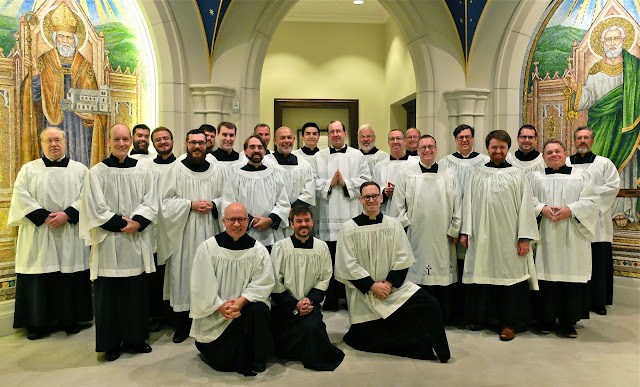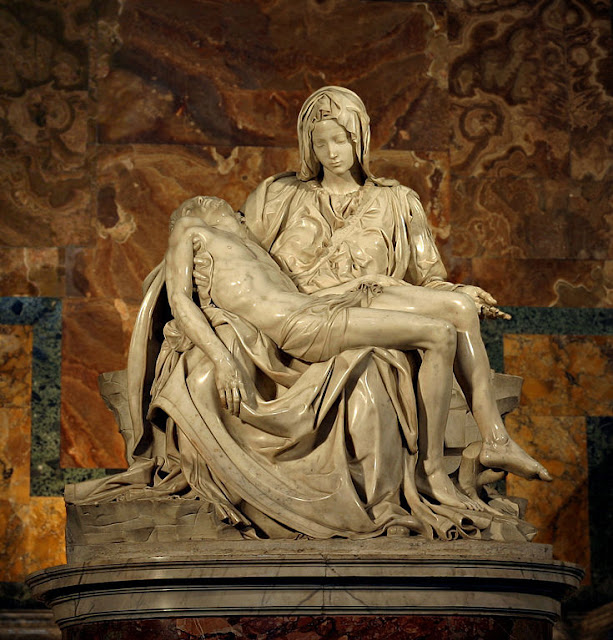The Christian Worldview as described by Fr. Schall
 |
| Lucas Cranach the Elder - The Last Judgment |
https://www.crisismagazine.com/2019/what-makes-the-christian-worldview-different-from-the-rest
Christianity and Nature
(T)he Christian worldview (...) has its roots in Israel. God and the world are separated. God had no need of a cosmos; creation itself was the result of a free plan to create something besides his Trinitarian life. Within this plan, God’s purpose was to associate in his inner, eternal life not with other created “gods” but with spiritual and intelligent corporeal beings. The physical cosmos was designed to support this intention. Man, as a race of rational, free beings, was given dominion over the earth.
Much of modern science and technology traces itself back to a secular form of individualism, but this contradicts the Christian view. God’s grant of dominion meant that man was to discover and use what nature had provided him over the ages. The world was not created perfectly so that everything would be provided for man without any human effort. Rather, he was given an imperfect world with abundant resources to see what, over time, he could do with them. Through the exercise of his reason and imagination man would reveal his own personal character.
Thus, in the process, each human person revealed his soul by what he did and how he responded with his craft as well as his political and contemplative powers while performing the ordinary tasks of mankind. Each person was also to be judged and assigned either heaven or hell based on the way he had lived. The Socratic principle—“It is never right to do wrong”—governed all human inter-relationships. Christianity affirmed and deepened this principle.
Human dignity and virtuous activity thus elevated the worth of each individual person. Now the ordinary activities of human beings in all phases and walks of life indicated before God and the world the real soul of that person. He is to love his neighbor by acting justly. The Christian tradition meant that both the transcendent world and the earthly city were joined in a non-contradictory interrelationship that gave ultimate meaning to the human person both in this and the next world.
The turmoil, suffering, and sins of mankind that permeate his entire earthly history are primarily due to each individual’s willful rejection of the order of nature and grace. This supernatural destiny was freely offered to him by God who desires each person, including the aborted, to gain eternal life. But because God respects the freedom given man to accept or reject the divine invitation, he allows each person to determine his own fate.
Prologue
"FATHER, . . . this is eternal life, that they may know you, the only true God, and Jesus Christ whom you have sent." "God our Savior desires all men to be saved and to come to the knowledge of the truth." "There is no other name under heaven given among men by which we must be saved" - than the name of JESUS.
I. The Life of Man - To Know and Love God
1 God, infinitely perfect and blessed in himself, in a plan of sheer goodness freely created man to make him share in his own blessed life. For this reason, at every time and in every place, God draws close to man. He calls man to seek him, to know him, to love him with all his strength. He calls together all men, scattered and divided by sin, into the unity of his family, the Church. To accomplish this, when the fullness of time had come, God sent his Son as Redeemer and Savior. In his Son and through him, he invites men to become, in the Holy Spirit, his adopted children and thus heirs of his blessed life.
2 So that this call should resound throughout the world, Christ sent forth the apostles he had chosen, commissioning them to proclaim the gospel: "Go therefore and make disciples of all nations, baptizing them in the name of the Father and of the Son and of the Holy Spirit, teaching them to observe all that I have commanded you; and lo, I am with you always, to the close of the age." Strengthened by this mission, the apostles "went forth and preached everywhere, while the Lord worked with them and confirmed the message by the signs that attended it."
3 Those who with God's help have welcomed Christ's call and freely responded to it are urged on by love of Christ to proclaim the Good News everywhere in the world. This treasure, received from the apostles, has been faithfully guarded by their successors. All Christ's faithful are called to hand it on from generation to generation, by professing the faith, by living it in fraternal sharing, and by celebrating it in liturgy and prayer.
Catechism of The Catholic Church
Prologue
"FATHER, . . . this is eternal life, that they may know you, the only true God, and Jesus Christ whom you have sent." "God our Savior desires all men to be saved and to come to the knowledge of the truth." "There is no other name under heaven given among men by which we must be saved" - than the name of JESUS.
I. The Life of Man - To Know and Love God
1 God, infinitely perfect and blessed in himself, in a plan of sheer goodness freely created man to make him share in his own blessed life. For this reason, at every time and in every place, God draws close to man. He calls man to seek him, to know him, to love him with all his strength. He calls together all men, scattered and divided by sin, into the unity of his family, the Church. To accomplish this, when the fullness of time had come, God sent his Son as Redeemer and Savior. In his Son and through him, he invites men to become, in the Holy Spirit, his adopted children and thus heirs of his blessed life.
2 So that this call should resound throughout the world, Christ sent forth the apostles he had chosen, commissioning them to proclaim the gospel: "Go therefore and make disciples of all nations, baptizing them in the name of the Father and of the Son and of the Holy Spirit, teaching them to observe all that I have commanded you; and lo, I am with you always, to the close of the age." Strengthened by this mission, the apostles "went forth and preached everywhere, while the Lord worked with them and confirmed the message by the signs that attended it."
3 Those who with God's help have welcomed Christ's call and freely responded to it are urged on by love of Christ to proclaim the Good News everywhere in the world. This treasure, received from the apostles, has been faithfully guarded by their successors. All Christ's faithful are called to hand it on from generation to generation, by professing the faith, by living it in fraternal sharing, and by celebrating it in liturgy and prayer.
.jpg)





Comments
Post a Comment
Your comments will be appreciated and posted if 1) they are on topic and 2) preserve decorum.
Stand by your word.